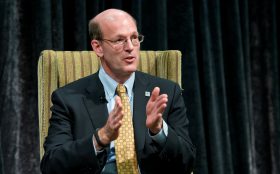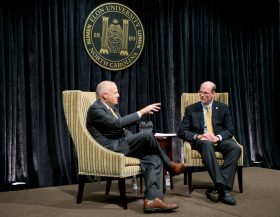Jonathan Reckford leads one of the world’s largest nonprofits focused on homeownership, and on Oct. 28, 2014, he visited Elon University to share lessons and advice for students dedicated to improving their communities through lives of service.

For the man who today directs the organization, there is plenty students can learn from habitat, not the least of which is how people find personal fulfillment in serving their communities.
Jonathan Reckford, Habitat’s Chief Executive Officer for nearly a decade, visited Elon University on Tuesday for a conversation in Lakeside meeting rooms led by Elon President Leo M. Lambert. Reckford’s appearance marked the formal start of Elon University’s yearlong focus on opportunities for students considering service programs after college.
Several themes framed the conversation between Reckford, Lambert and students who asked questions during the hourlong event.
Decide who you want to be before you decide what you want to do: Reckford told students to establish “guideposts” that will help them evaluate future career opportunities. It’s more important to identify a value system before embarking on a job that may ultimately leave them feeling unfulfilled, he said.
And don’t overlook service opportunities that already exist. “There’s a tendency that I both admire and cringe at, and that’s every student feels the need to start their own nonprofit,” Reckford said. “We have millions of nonprofits in the country and many of them aren’t having much of an impact. … we need to find things that work and do them at a much larger scale to change society.”
Failure isn’t always a bad thing. It builds resilience: People learn more acutely when they fail. Learning to fail in college, where classroom efforts may fall flat or other goals remain elusive, develops an ability to overcome obstacles or shortcomings later in life.
“If you haven’t set a goal for yourself that is so hard you might not make it, you probably haven’t tested yourself as a college student,” Lambert said. “And if you fail at Elon … someone will be here to pick you up and help you.”
Facts and figures offer evidence but “stories are what change hearts”: Habitat for Humanity improved a village in Brazil by helping its residents build structures in lieu of the beetle-infested mud huts then used for housing. The nonprofit also installed cisterns to assist villagers with collecting rain water to survive dry seasons.
After improving their housing and health, Reckford said, residents turned their attention to economic development, which included a micro financed effort to produce embroidery.
“You now have a self-sustaining community where women have economic empowerment and the kids are getting educated,” Reckford said. “To me, that’s what good looks like.”
Don’t be afraid to volunteer or to ask others to join you. It helps the community and you feel better about yourself: Reckford pointed to Elon University’s extensive resources and service offerings when he explained the way in which volunteer work can spark new passions or awareness of global concerns. He cited research that demonstrates personal fulfillment from service activities and suggested that students work together in addressing community issues.
“You know the No. 1 reason people volunteer? Somebody asked them to. It’s so basic and it’s amazing. It’s also the No. 1 reason people give,” Reckford said. “Most people end up volunteering because someone says, ‘Hey, I’m doing this and I’m excited, why don’t you come along and check it out?’”

He suggested to his audience that everyone find “a small group of people who love you enough to give you the unvarnished truth” about tough questions and situations.
“I believe that individuals and organizations need ferocious systems of accountability, not because you don’t trust people, but because we’re all capable of doing bad things,” he said. “It’s very rare that people set out saying that they’re going to do terrible things. It’s a whole series of very small missteps where you end up in a completely different direction than you ever imagined.”
Reckford is a North Carolina native who also graduated from the Stanford University Graduate School of Business. He previously worked in executive and managerial positions at Goldman Sachs, Marriott, the Walt Disney Co. And Best Buy.
Though he began his career on Wall Street, Reckford in 1986 was awarded the Henry Luce Scholarship, which provided the opportunity to work in marketing for the Olympic Organizing Committee in preparation for the 1988 Olympic Games in Seoul, where he also coached the Korean National Rowing team. Reckford returned to the United States for his MBA and eventually found an avocation helping to coach pastors in dealing with the management side of church life.
In 2003, that volunteer service turned into full-time ministry as Executive Pastor of a 4,300-member church in Edina, Minn. He would join Habitat for Humanity two years later. “He’s a tremendous leader we have in our midst tonight, and it’s a great, great privilege for Elon University,” Lambert told the Tuesday night audience.
The “Making a World of Difference” event series continues in November with additional events:
Thursday, November 6
4:15 p.m.
Moseley Center’s McKinnon Hall
Alumni panelists discuss their service experiences and how it impacted their career paths.
Tuesday, November 11
4:15 p.m.
Student Professional Development Center (Moseley 140)
A workshop for students who want help with service applications, writing resumes and personal statements.
Thursday, November 13
3-5 p.m.
Service Expo in Moseley Center’s McKinnon Hall
Students will explore service opportunities and network with national and international nonprofit organizations.


